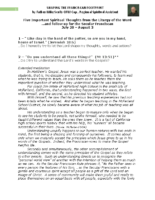(Article attached for printout in pdf format) Five Important Spiritual Thoughts from the Liturgy of the Word
…and follow up for the Secular Franciscan
July 28 – August 3
1 – “Like clay in
the hand of the potter, so are you in my hand,
house of Israel.” (Jeremiah 18:6)…Do I honestly try
to let the Lord shape my thoughts, words, and actions?
2 — “Do
you understand all these things?” (Mt 13:51) **…Do
I try to understand the Lord’s words in the Gospels?
Extended meditation
In
Matthew’s Gospel, Jesus was a perfect teacher. He wanted his students, that is,
his disciples and consequently his followers, to learn well what he was trying
to teach. He asks them as he teaches them the important question of whether
they understood what he was teaching.For
coach Jim White of McFarland High School in the small city of McFarland,
California, that understanding happened in two ways, the first with himself,
and the second, as he directed his student-athletes.With
himself, he saw that his previous teaching experiences had not been totally
what he wished. And after he began
teaching in the McFarland School District, he slowly became aware of what his
job of teaching was all about.His understanding as a teacher began to
mature only when he began to see his students to be people, not unlike himself,
who needed to be taught different values than the ones they knew. It is a fact of California high school sports
history that with his help, his “runners” all became successful in their lives.
(Movie: McFarland USA)Understanding usually happens in our
human natures with two ends in mind, the first being a shaping and forming of ourselves. It comes about only when we maturely accept
the principles which Jesus gives to us in his words of the Gospels. Indeed, the Franciscan vows to make the
Gospel her/his life.Secondly and simultaneously, the other accomplishment
of understanding comes with the same principles of the Gospel as they relate to
other people. Such an understanding
directs us to recognize the “personal world view” of another with the intention
of helping them as much as we can. As
the Secular Franciscan Rule phrases, it, “As the Father sees in every person
the features of his Son, …so the Secular Franciscans with a gentle and courteous
spirit accept all people as a gift of the Lord and an image of Christ. A sense of community will make them joyful
and ready to place themselves on an equal basis with all people, especially
with the lowly for whom they shall strive to create conditions of life worthy
of people redeemed by Christ.” (Rule of the Secular
Franciscans, 13)
3 — “I am the resurrection and the life; whoever believes in me, even if he dies,
will live, and anyone who lives and
believes in me will never die. Do you
believe this?” (John 11:26)**…We readily
answer the Lord that we believe that he is the resurrection and the life. How can
I show that belief a little more during the upcoming days?
Extended
meditationPerhaps more than any other
doctrine, the Christian belief in life after death depends solely on
faith. No human being has ever returned
from the dead. We have stories from
people who claim to have experienced life after death in “near death
experiences,” but there is no proof that there is life after death except for
what Scripture offers. But Scripture is
very clear. This life that we are living
is merely “part one” of life. “Part two”
is what we choose while we are involved in “part one.” If we choose the path of good, we will have
our eternal reward in heaven; those who choose evil will have an eternal
punishment.A person familiar with the
Christian Scriptures knows that Jesus raised Lazarus from the dead. But the important fact of the story of
Lazarus and his sisters is that it did not matter whether Jesus brought Lazarus
back to earthly life or not; what mattered was that Lazarus was already alive
in the eyes of God. As Jesus tells
Martha, whoever believes in him will never die.An interesting thought from
our belief in part two of life, or eternal life, is that part one, our life
here on earth, can be better because of our belief in heaven. The thought is cleverly portrayed in the
movie “Hereafter.”Psychic George Lonegun knew
that he had a gift of communicating with the dead. He called the gift a curse because inevitably
he discovered many people who wanted to know about their past, but the
knowledge often did nothing more than make them miserable. At her persistent request, however, George
finally listened to Marie Lelay about her experience.The movie’s philosophical
conclusion is portrayed in the present life of George and Marie as they fall in
love. They are drawn together by their
knowledge of the afterlife, and the unwritten statement is that they will live
happily together. Their life “part one”
is better because of their mutual belief in life “part two.” (Movie, “Hereafter”)Such a conclusion is, more
or less, the conclusion of Christianity and therefore Franciscanism: once we
understand that the afterlife—or in Christian terms, “heaven”—exists,
our present life here on earth should take on a different and more profitable
meaning.Further, and a negative
thought that must accompany the thought of eternal happiness, as we experience
life “part one” here on earth, we must be very much aware that although our
present life can be enhanced by our belief in the “afterlife,” we believe that
we can also choose the opposite. We
still possess a free will. We may choose
to have “eternal death” if we refuse to live that good life.Knowledge of a good ending
is an incentive to work diligently toward such an end. If we do God’s work, and do it well, living a
truly Christian life, a happy life on earth will be ours, as well as the
“afterlife” in heaven.
4 — “His
heart was moved with pity for them.” (Mt 14:14)**…In my life, in general, do I look at others with a desire to
help them if they need it?
5 – “Woman,
great is your faith.” (Mt 15:28)**…In what ways can I show my faith in a
stronger way?
** One of the most
important passages of the Gospels

